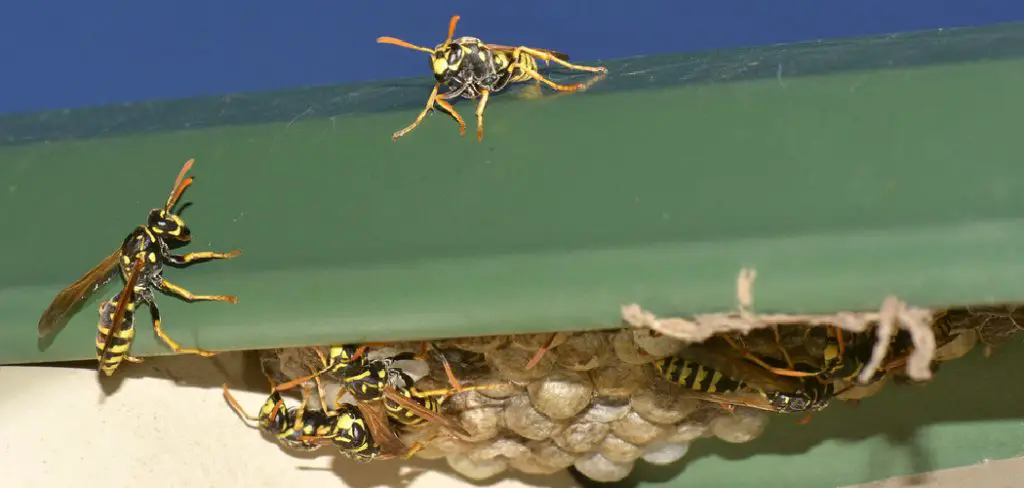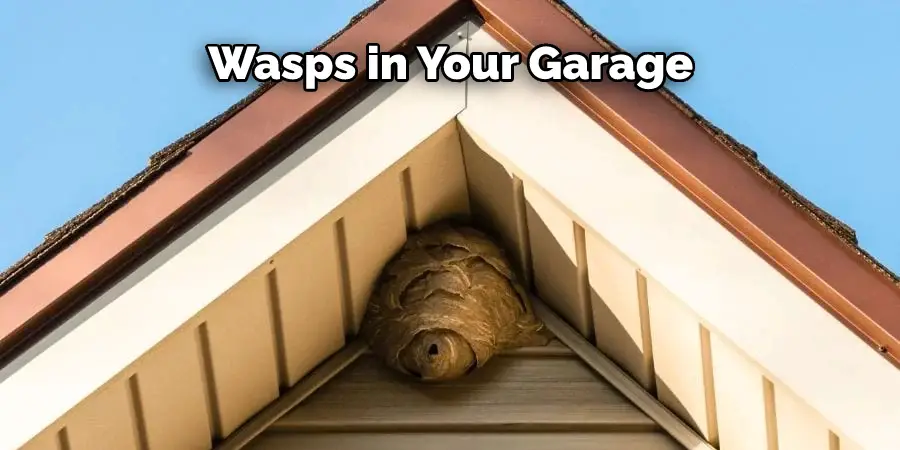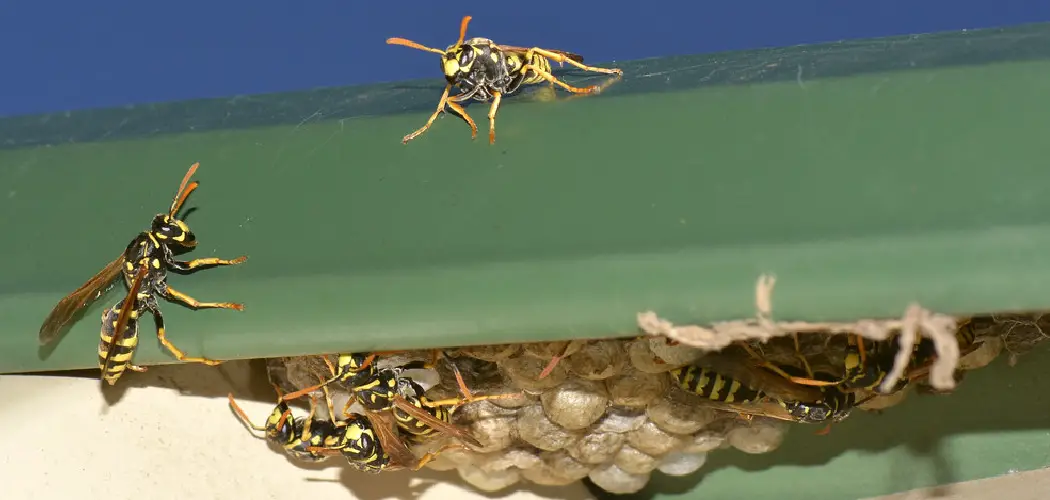Summer is in full swing, and that means plenty of outdoor activities. If you’re like most people, your garage is a central part of your summer routine. But did you know that wasps love to nest in garages, too? Every summer, wasps seem to find their way into our garages. This can be a real problem, especially if you have allergies. In this blog post on how to keep wasps out of garage, we will share some tips on how to keep wasps out of the garage. Keep reading for more information.

What is a Wasp?
Before we dive into ways to keep wasps out of your garage, it’s important to know what exactly a wasp is. Wasps are flying insects that belong to the order Hymenoptera, and there are over 30,000 different species of wasps. They can vary in size, color, and behavior, but all have similar characteristics, such as a slender body, narrow waist, and two pairs of wings. Wasps are known for their painful stings and can cause allergic reactions in some people.
It’s important to note that not all wasps are aggressive and pose a threat. Some species are actually beneficial insects as they help with pollination and control other pest populations. However, when they start building their nests in your garage, it can become a nuisance and potentially dangerous.
What Causes Wasps to Nest in Garages?
There are a few reasons why wasps might nest in your garage. First, garages provide plenty of hiding places for wasps. Second, wasps are attracted to dark, secluded areas. If your garage is cluttered, has cracks in the walls, or is otherwise not well-sealed, wasps will be able to find their way in.
Another reason why wasps might nest in your garage is that they are attracted to the food that is stored there. Wasps are drawn to sweet smells, so if you have food stored in your garage, they will be attracted to it. However, even if you don’t have food in your garage, wasps may still nest if they find other food sources nearby.
The other major reason why wasps nest in garages is because they are looking for a place to build their nests. Wasps will build their nests in any location that provides them with shelter and protection. If your garage meets these criteria, wasps will be more likely to nest there.

12 Easy Ways How to Keep Wasps Out of Garage:
1. Repair Cracks and Holes in Your Garage
The first step in keeping wasps out of your garage is to repair any cracks or holes in the walls. Wasps can squeeze through tiny spaces, so it’s important to seal up any openings that they might be able to use to get inside. To repair cracks and holes, first identify all of the problem areas in your garage. Then, use caulk or another type of sealant to fill in the cracks and holes. Be sure to check the sealant regularly to make sure that it is still effective.
2. Keep Your Garage Clean and Clutter-Free
Another way to keep wasps out of your garage is to keep it clean and clutter-free. Wasps are attracted to dark, secluded areas. If your garage is cluttered, it will provide them with the perfect place to build their nests. To keep your garage clean, make sure to sweep it regularly and put away any clutter that might accumulate. If you have any items that you don’t use often, consider storing them in a different location.
3. Store Food Properly
If you store food in your garage, it’s important to store it properly. Wasps are attracted to sweet smells, so if you have food that is not properly sealed, they will be drawn to it. To keep wasps away from your food, store it in airtight containers. You should also keep food away from the walls of your garage, as wasps may be able to smell it through cracks and holes. Additionally, regularly clean up any spills or crumbs to eliminate potential food sources for wasps.
4. Keep Trash Cans Covered
Trash cans are another major source of food for wasps. If you have trash cans in your garage, be sure to keep them covered. Wasps will be able to smell the food inside of them and will be drawn to the cans. To keep wasps out, first, make sure that your trash cans are clean. Then, put a lid on them and keep the lid closed. If you have a lot of trash, you may need to invest in a larger trash can with a tight-fitting lid. Otherwise, consider taking out the trash more frequently to avoid buildup.
5. Eliminate Water Sources
Water is another attractant for wasps. If you have a water source in your garages, such as a leaky pipe or a puddle, wasps will be drawn to it. To keep wasps away, first, identify any sources of water in your garage and fix them. Then, make sure that there is no standing water anywhere in the garage. If you have a hose, be sure to put it away when you’re not using it. If you have plants in your garage, water them only when necessary.
6. Use Peppermint Oil
Peppermint oil is a natural repellent for wasps. To keep wasps away, put a few drops of peppermint oil on a cotton ball and place them near the areas where wasps are a problem. You can also put peppermint oil on a piece of string and hang it near wasp nests. The oil will repel the wasps and keep them away from your garage. Be sure to replace the cotton balls or string every few days as the scent wears off. Otherwise, you can also plant peppermint around your garage as a natural deterrent.
7. Use a Wasp Repellent
If you want to keep wasps away from your garage, you can use a commercially available wasp repellent. There are many different types of repellents on the market, so be sure to read the label carefully to find one that is effective against wasps. You can apply the repellent around the perimeter of your garage, or you can spray it directly on wasp nests. The repellent will create a barrier that keeps wasps away. You may need to reapply the repellent periodically for maximum effectiveness.
8. Use a Wasp Trap
If you have a problem with wasps in your garage, you can use a wasp trap to catch them. There are many different types of wasp traps available, so be sure to choose one that is appropriate for the size of your garage. Once you have set the trap, check it regularly and empty it when necessary. If you catch a lot of wasps, you may need to move the trap to a different location. But be sure to do this carefully to avoid getting stung.
9. Remove Wasps Nests
If you have wasps in your garage, the best way to get rid of them is to remove their nests. Wasp nests can be found in various locations, so be sure to look around carefully. Once you find the nests, you can remove them with a vacuum cleaner or by spraying them with a wasp killer. If you have a lot of wasps, you may need to call an exterminator. Once the nests are removed, be sure to seal any openings or holes where the wasps were getting in.
10. Use Lights
Wasps are attracted to darkness. If your garage is well-lit, wasps will be less likely to nest there. Be sure to turn on the lights in your garage when you’re working in there, and consider leaving them on at night. You can also install motion-sensor lights around the perimeter of your garage. These lights will turn on when wasps are present, and they will help to keep them away. Just be sure to change the light bulbs regularly to ensure that they are always functioning properly.
11. Kill Wasps on Sight
If you see a wasp in your garage, kill it on sight. Wasps are aggressive and will defend their nests if they feel threatened. If you kill wasps, they will be less likely to nest in your garage. You can kill wasps with a fly swatter or by spraying them with a wasp killer. Kill wasps as soon as you see them, and be sure to dispose of their bodies properly. Avoid squishing wasps, as this will release pheromones that can attract other wasps. Remember to always use caution when dealing with wasps and wear protective gear, i.e., gloves and long-sleeved clothing, to avoid getting stung.
12. Hire a Professional
If you have a serious problem with wasps in your garage, you may need to hire an exterminator. An exterminator will be able to identify the source of the problem and will be able to get rid of the wasps for good. If you have a lot of wasps, you may need to have the exterminator come back for multiple visits. This can be expensive, but it may be necessary for a severe infestation. Be sure to research and hire a reputable exterminator with experience in dealing with wasp problems.
Following these tips on how to keep wasps out of garage can help to keep wasps away from your garage and prevent future infestations. Remember to always exercise caution when dealing with wasps, as they can be dangerous if provoked. With a little effort and preventative measures, you can enjoy a wasp-free garage all year round. So don’t let those buzzing pests ruin your time in the garage; take action and keep them out for good!
How Much Does Wasp Removal Cost?
The cost of wasp removal depends on the severity of the problem. If you have a small number of wasps, you may be able to remove them yourself. However, if you have many wasps, you may need to hire an exterminator. The cost of hiring an exterminator can vary depending on the size of your garage and the number of wasps. Expect to pay anywhere from $50 to $500 for wasp removal.
You may also need to factor in additional costs, such as repairing any damage caused by the wasps or hiring a professional to seal any openings where the wasps were entering. It is always best to get quotes from multiple exterminators and compare their services before making a decision. Keep in mind that investing in professional pest control services can save you time and money, as well as potential harm from dealing with wasps on your own. Prevention and proper maintenance are key to avoiding future infestations, so it may be worth investing in regular inspections and treatments to keep your garage wasp-free. So don’t let the cost deter you from seeking professional help, as it can be a small price to pay for peace of mind and a safe living space.
Tips and Warnings on How to Keep Wasps Out of Garage:
Tips:
1. Be sure to keep your garage door closed as much as possible.
2. If you have any cracks or gaps in your garage, seal them up as wasps can enter through these openings.
3. Store food in airtight containers and keep it out of reach of wasps.
4. Keep trash cans sealed tight and empty them regularly.
5. Keep wasp nests away from your garage if possible.
Warnings:
1. Do not attempt to remove a wasp nest on your own, as this can be extremely dangerous.
2. If you see a wasp inside your garage, do not panic and try to avoid it if possible.
3. If you are stung by a wasp, seek medical attention immediately.
4. Always use caution when dealing with wasps, as they can be aggressive and dangerous.
5. Do not use insecticides inside your garage as this can be dangerous to you and your family.
Frequently Asked Questions:
Q: How Do I Prevent Wasps From Entering My Garage?
A: To prevent wasps from entering your garage, you can seal any cracks or gaps in the walls and doors. You can also use peppermint oil or a commercial repellent to deter them. If you have plants, be sure to water them only when necessary and clean up any standing water. Additionally, keeping your garage well-lit and disposing of any wasp nests can also help prevent them from entering.
Q: Can I Remove a Wasp Nest Myself?
A: It is not recommended to remove a wasp nest on your own as it can be dangerous. Wasps are aggressive and will defend their nests if they feel threatened. It is best to hire a professional exterminator for safe and effective removal. You can also use a wasp trap to catch and remove them from your garage. The nest should be disposed of properly to prevent any future infestations.
Q: How Often Should I Check Wasp Traps?
A: It is recommended to check wasp traps regularly, especially during peak wasp season. Depending on how many wasps you catch, you may need to empty the trap and move it to a different location. The traps can also be cleaned and reused as needed. Checking the traps regularly will help keep your garage wasp-free and prevent any potential infestations.
Q: How Long Does Wasp Removal Usually Take?
A: The time it takes for wasp removal can vary depending on the severity of the infestation. If you have a small number of wasps, removal can be done in a matter of hours. However, if you have a large infestation, it may take multiple visits from an exterminator to completely get rid of the wasps. It is important to address the problem as soon as possible to prevent it from getting worse.
Q: Are There Any Natural Ways to Keep Wasps Away?
A: Yes, there are a few natural ways to keep wasps away from your garage. These include using peppermint oil, hanging fake nests, and planting certain herbs and flowers that repel wasps. However, these methods may not be as effective as hiring a professional exterminator or using commercial repellents. It is important to regularly monitor for wasp activity and take necessary precautions to prevent infestations.
Overall, it is important to address a wasp problem as soon as possible to ensure your safety and that of your family. By following these tips and precautions, you can keep your garage wasp-free and enjoy using it without any worries.
Conclusion paragraph:
It is clear that wasps can be a nuisance, but there are ways to keep them out of your garage. By following the tips in this article on how to keep wasps out of garage, you can make your garage less appealing to wasps and deter them from nesting there. If you have any questions or need more help, please get in touch with us. We would be happy to assist you further. Remember to stay safe and use caution when dealing with wasps, and always seek professional help if needed. Keep your garage wasp-free and enjoy having a pest-free space for your car and storage needs.


